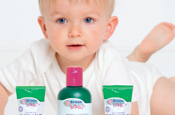The change in climate coincides with research commissioned by media agency OMD showing that a greater number of men are spending more time and energy on their children, in turn representing a growing market for brands.
The OMD study, which was carried out by Ipsos in April, among 500 mothers and 200 fathers, revealed that more than half of respondents agreed that dads play a more active role in children's upbringing than the previous 'hands-off' generation. Jo Rigby, research and systems director of Omnicom Media Group EMEA, says brands are missing out by failing to target this fresh generation of dads. 'Many brands have been slow to adapt to the changes in the family unit and find it is safer to speak to mums and ignore the changes in society,' she says.
A small number of brands and government agencies have recognised this trend and are beginning to target fathers directly. The National Literacy Trust, for example, began to advise schools and NGOs to engage with them, following research revealing that fathers in England are less likely than mothers to read with their children. The Trust wrote a 'Getting the blokes on board' manifesto containing suggestions on how to communicate with dads. Events labelled for parents tend to attract mothers, according to the study, so addressing letters directly to fathers was one way to get them more involved.
Kimberly-Clark's nappy brand, Huggies, has also entered the fray with the launch of a public forum on its website, at www.huggiesclub.com, dedicated to enabling fathers to give and receive advice and support. John Waters, marketing director, Kimberly-Clark UK and Ireland, claims the brand has 'always recognised the vital role that dads play in the lives of their children'.
Andrew Thomas, executive director of Bounty.com, the pregnancy, baby and parenting club, says that historically his company has spoken exclusively to mothers. 'There is a gulf in information for new dads and we need to develop more resources for them - the old truism that dads only want to be involved with their children when they can catch or kick simply isn't relevant anymore,' he adds.
While fathers are playing a bigger role in family life, mothers are still the 'chief executives of the household,' according to Thomas. However, he cites other areas, like the purchase of family cars and pushchairs, and financial products, such as the investment of child allowance, where the father takes the lead. This sentiment is echoed by Rigby, who adds: 'Anecdotal evidence suggests that when it comes to bigger purchases - from car seats to buggies - it is often a joint decision.'
Nonetheless, brands must tread carefully. 'There are two opposing trends,' explains Rigby. 'While dads are becoming more important, brands must also be mindful of the fact that one in three families is headed by single mothers who may be alienated by a focus on dads or the traditional nuclear family.'
Jill Barker, founder of environmental children's brand Green Baby, says it is not necessary to target mothers and fathers separately and, in line with this, the firm is not planning to increase its focus on stay-at-home dads. 'The challenge for brands with the changes in the family unit is to find a common connection point with the main carer, whether they are male or female and no matter what their relationship is to the child,' she says.
Fathers have certainly become far more active in childcare, and increased paternity rights is a significant political issue.
Industry experts believe that any change in the latter could trigger a wave of activity from brands. However, Rigby says that waiting for change in legislation would be a 'reactive' approach and brands that move to connect with fathers now will reap the benefits. 'There is definitely a need for brands to be more inclusive as we move into a new era of social responsibility,' she adds.
The growing number of stay-at-home dads, as well as working fathers spending more time and money on their children, provide a unique opportunity for brands. Companies failing to take time to understand this market and engage with the new army of active dads could be missing a trick.
Survey results
Agreement with the following statements:
Mothers/Fathers
82%/80%
I am the primary decision-maker
43%/41%
I tend to recommend good products and/or brands to others
45%/38%
It is important for me to have time to myself each day
51%/36%
My friends are a very important part of my life
26%/41%
My profession or career is a very important part of my life
Fathers
57% I play a more active role in my child's upbringing than my father did
56% Men should be entitled to more paternity leave
40% My spouse and I contribute equally to caring for our child
Conclusion:
Mothers and fathers are equally important target audiences for marketers and advertisers
Today's fathers play a more active role in parenting
Mothers value their 'me' time and social life more than fathers; but having a profession is more important for fathers


